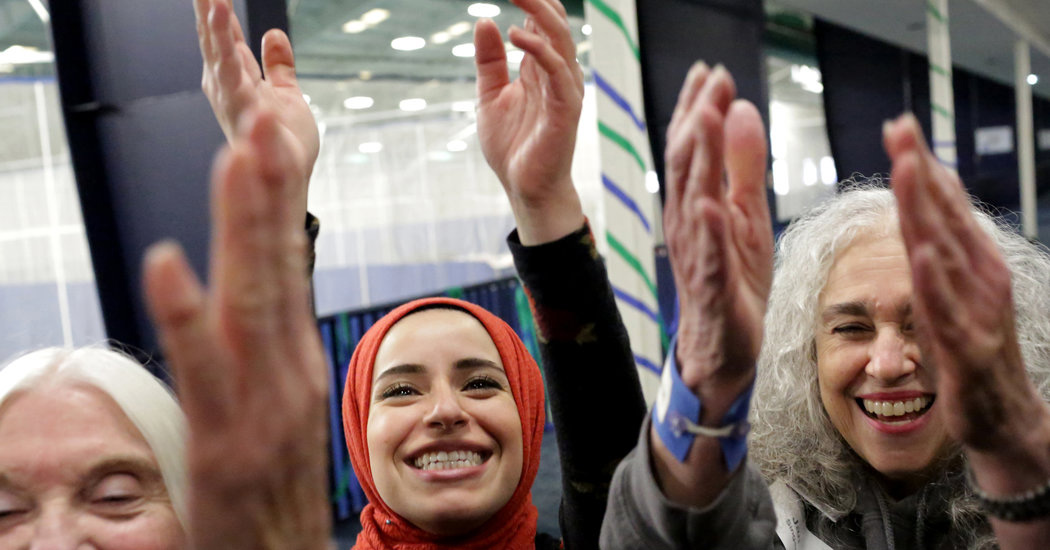When American Muslims and Jews talk, the Israel-Palestine conflict is always present.
by Letty Cottin Pogrebin
American Jews and American Muslims have had a lot of reasons lately to come together. But often when these two communities join forces, whether for joint action or for dialogue, there’s an elephant in the room—a pachyderm with a Palestinian on it.
Interfaith groups and social justice organizations, despite their best efforts to be apolitical or laser-focused on domestic concerns, almost inevitably end up grappling with Israel-Palestine issues. Muslims challenge Jews to justify the second-class status of Palestinian Israeli citizens inside the Green Line, or the harsh living conditions of Palestinians under military rule in the occupied West Bank, or the latest land grab perpetrated by Israel’s increasingly extreme right-wing government. Jews want Muslims to repudiate Islamic terrorists and reassure non-Muslims that Islam is not inherently violent. Arabs are expected to answer for Palestinian rock-throwing or knife attacks, for anti-Semitic incidents on college campuses or for Boycott, Divestment and Sanctions (BDS), which many Jews consider an existential threat to Israel.
Awkward encounters aren’t the only challenge. Muslims who engage in dialogue with Jews have been known to get death threats from fellow Muslims. And Jews who engage in outreach to Palestinians and other Arab-Americans are sometimes labeled self-haters.
In January, at an all-day conference on American Jews and Muslims held at the Shalom Hartman Institute in New York, several speakers acknowledged the elephant but urged honest engagement, not avoidance. Yehuda Kurtzer, president of the Hartman Institute, said it is possible to feel “responsibility to others…without abandoning our own commitments.” Imam Abdullah Antepli, chief representative of Muslim affairs at Duke University, called for “a coalition of like-minded” Muslims and Jews to “stop the hate, open channels, use respectful language—at least hear each other.”
After the conference, Kurtzer published a provocative essay in the Jewish Journal that began, “Those seeking to build coalitions must make a difficult decision early on: What compromises are we willing to make on other core commitments in order to effectively organize with those who share this core commitment?”
The question isn’t theoretical. The other day, a Jewish friend told me she loathed President Donald Trump’s travel ban but was afraid to join a pro-immigration demonstration for fear a news photo might catch her near a pro-BDS banner. Rabbis say the Israeli-Palestinian conflict is the third rail for sermons; many synagogue boards, JCCs and federations, fearing divided congregations and pushback from donors, have erased Mideast politics from public discourse. When such issues are unmentionable, it’s hard to build bridges, even to likely allies.
As an activist, I’ve often asked myself: What would make it impossible for me to join forces with others on an issue I believe in? If a “pro-life” woman invites me to join a campaign against sex trafficking, but I know that her group is also working to criminalize abortion, it’s not her view of abortion that’s the deal-breaker for me. It’s her position on who gets to control women’s bodies. I believe neither sex traffickers nor the Trump-Pence administration should control women’s bodies, so I can’t make common cause with someone who would deny women the freedom that starts inside one’s own skin.
When it comes to Israel and Palestine, I’m with Nancy Kaufman, CEO of the National Council of Jewish Women, who says she’ll work with anyone “except those who reject Israel’s right to exist.” (As executive director of the Boston Jewish Community Relations Council, Kaufman joined an anti-violence coalition that included the Nation of Islam.) This winter, she met in advance with organizers of the Women’s March on Washington to ensure that their messaging would be “pro-something, not anti-Israel.” She received assurances that the march would focus on the issues NCJW cares about—women’s health, reproductive justice, immigration, children and families, economic inequality, voting rights, misogyny and bigotry.
The Washington march did all that and more based on its core commitment to “intersectionality,” the belief that all forms of oppression are linked and must be confronted simultaneously. Given today’s vitriolic political environment, intersectionality is not just a galvanizing theory, it’s an organizing tool. Big tents have more space, even for elephants.
Sheryl Olitzky, founder of the Sisterhood of Salaam Shalom, which fosters links between American Muslim and Jewish women, told me how her groups deal with Israel and Palestine: “Until we can say there is more to our relationship than the one thing that divides us, there won’t be a relationship.” The sisterhood provides its 150 chapters with a curriculum on “how to be a compassionate listener.”
My eight years in a Palestinian-Jewish dialogue group have taught me that listening to “the other” does not threaten Jews; it educates us. It doesn’t eradicate our Zionism; it tunes up our empathy and forces us to define Israel’s founding principles more precisely, hold the nation to its own higher standard and be better informed when we question its policies.
Yavilah McCoy, an African-American Jew and seasoned activist, says progressives need to “develop language for our own diversity and accept that we don’t agree on everything.” She faults Jews who monitor other Jews’ commitments and subject them to “street cred one-upmanship”—for instance, cross-examining them on where they stand on Israel-Palestine issues rather than reaching out “from the heart.” “There’s too much blaming and shaming,” she says. “We need to dig deeper for what’s at stake.”
What’s at stake is everything. Many of us have come to understand that we must resist anti-Semitism and Islamophobia and sexism and racism at the same time and in unity. Oppression is not a zero-sum game. Our common enemy is hatred and hierarchy, not each other. As an African proverb says, “When elephants fight, the grass gets hurt.”
Letty Cottin Pogrebin’s latest book is the novel Single Jewish Male Seeking Soul Mate.

